Apple's Mac Pro - Upgrading CPUs, Memory & Running XP
by Anand Lal Shimpi on September 12, 2006 1:51 AM EST- Posted in
- Mac
Next we had to remove the fan assembly, which we did by first removing two of the hard drive sleds so we could gain access to the lone screw that holds the fan assembly in place. Then, with a flexible putty knife we pulled the edge of the assembly away from the case and attempted to pull it out. The fan assembly will pull straight out, although we've found that it's a very tight fit and wiggling sometimes helps as you pull it out.
The fan assembly is made out of plastic so be careful as you're doing this; you'll want to put pressure on the less flimsy parts of the assembly to avoid snapping/cracking anything. Also be careful not to put pressure on the heatsinks as the aluminum is very thin and will bend very easily.
With the fan assembly out take a moment to marvel at how large and heavy it is, and then put it aside as we need to get one more thing out of the way before we can unscrew the heatsinks. If you can get the memory cage out then this next step isn't necessary, but if you're like us and can't get the thing out then this next step will make removing the heatsinks a lot easier.
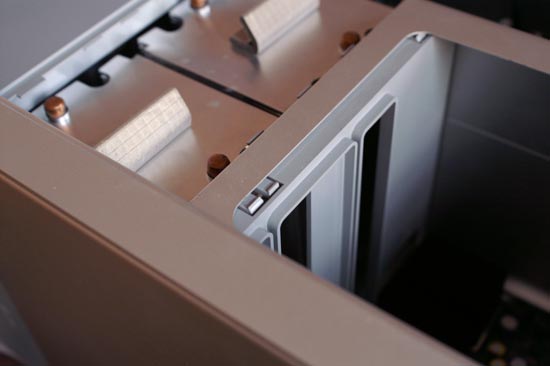
The plastic guard, pulled out slightly to expose the latches - Click to Enlarge
There's a plastic piece that sits in the left side of the memory cage; it's what the CPU heatsink cover latches on to on this side and it's also what helps the memory risers guide into place. This plastic piece can be removed fairly easily as it just latches into the memory cage itself, so break out the putty knife and let's get to it.
All you need to do is unlatch the plastic guard from the memory cage by sliding your putty knife between the cage and the guard. As you unlatch the plastic guard start pulling it away from the CPUs and eventually you'll get it off completely. Patience pays off here as you don't want to break any of the latches.
With the plastic guard off, it's now infinitely easier to gain access to the screws that hold the heatsinks in place. Each heatsink is attached to the motherboard by four allen screws; simply remove them (in an opposite side/opposite corner pattern) using a very long screwdriver (or a small allen wrench). We didn't have an allen wrench that worked so we attached two extenders to our screwdriver to get down to the screws.
With all of the screws undone for the first heatsink (the allen screws don't come off completely, they remain attached to the heatsink) you have to disconnect the thermistor cable that runs from the heatsink to the motherboard. Be sure to do this before you remove the heatsink as you don't want to cause any accidental damage to the cable.
Finally you lift off the heatsink and set it aside, exposing the LGA-771 Xeon socket below. You can repeat the process for the second heatsink, also not forgetting to remove its thermistor cable (this one is actually beneath the memory cage) before pulling off the heatsink. With both heatsinks removed, it was time to swap processors.


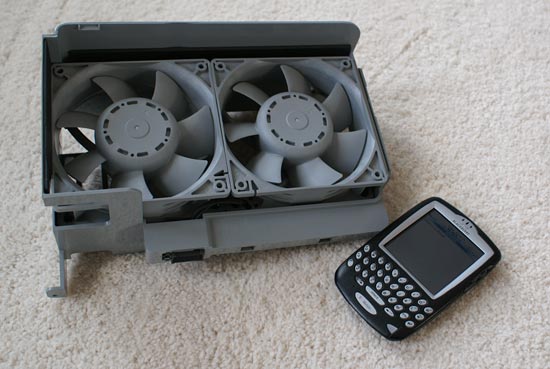
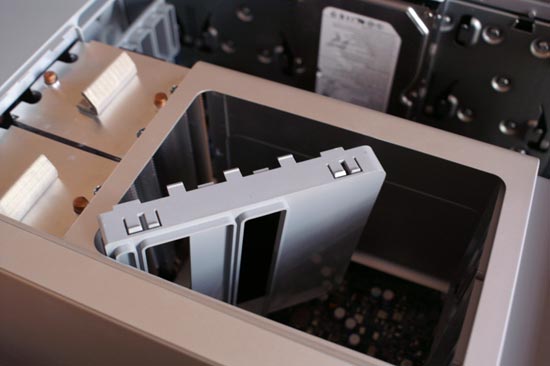
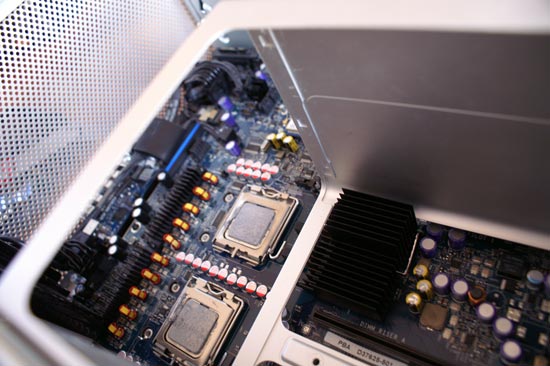
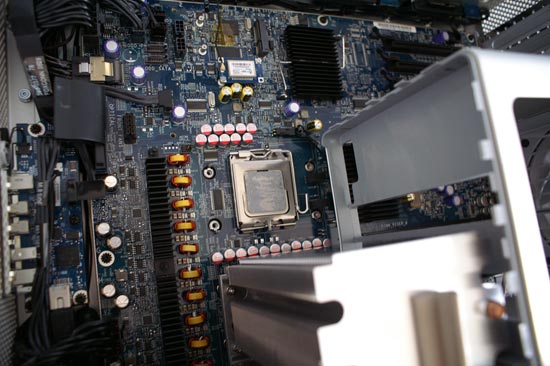
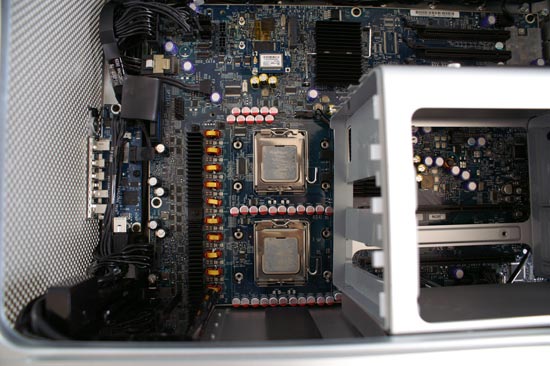








72 Comments
View All Comments
cmdrdredd - Wednesday, September 13, 2006 - link
" There were times when the Microsoft's consumer operating systems were not good enough for some tasks, and also the software for such tasks was running mainly on the Apple's platform. There was a time when Desktop Publishing was made only on Macs, there was a time when video editing was made almost only on Macs, there was a time when... There were times when the software optimised to run on Mac ran faster than what you could have on PC, was much less crash-prone, and so on.As of now, most of the software you find on Mac you can find on PC, with some limitations (like memory support for really great amounts of memory) Microsoft's consumer operating systems are stable enough, and the performance of the x86 ran circles around the Power architecture in older Macs. As a result, keeping high prices will only hurt Apple's market, and people that used a Mac will use a PC. Apple has nowhere to go now, as its market share would be cornered from all sides. Most of the "professional users" (I've seen this on a video editing computer in the days of the Pentium MMX) knows their program, and just a bit more. For them, having the wonderful Mac OS X interface or a command line interface has little effect, as long as their program runs nice, well and fast."
That's very very true. There was a time when you couldn't really do everything on one system. Specifically with regards to graphic design and sound/video. It used to be a Macsclusive area. These days WindowsXp is mature enough that most people don't mind using it for those tasks which used to never be run on PCs. Both platforms compare well with eachother these days. The problem is that for some people, Apple is not different anymore. There used to be people who bought apple stuff because it was thought to be superior to PCs and less troublesome. Bringing WindowsXP to a Mac is good and bad. Good because now a consumer/business can use both OSes equally, and bad because some people may start to think of Apple like Dell or Compaq. Just another large OEM.
One thing I really dislike is how apple still hates on Windows. Sure there was a day when Windows was pretty bad and didn't work well. Those days are gone and in some ways WindowsXP feels better than OSX to me. I own 7 Macs and OSX never feels as smooth as Windows. There's always something sluggish about it, but it's very hard to say what it is. Could be slow disk access, slow video performance, slow memory fetching who knows. I used to be one of the people who hated windows cause it was hard to understand and didn't work well. Today I prefer Windows. Not just for gaming either. You can do anything on a PC that you can on a Mac. Pretty much all of the professional apps are available on both platforms.
newrigel - Monday, September 1, 2008 - link
I own both and my mac smokes my PC's and I have the latest and greatest PC's made!!!For audio, the Mac rules because I can audition an audio file within the file hierarchy and with windows I can't so...
greylica - Tuesday, September 12, 2006 - link
I Guess Fully Buffered Dimms, with a new controler that can cut latencies will do it just fine, and sooner or later we will have a situation where every part of theh computer can achieve higher performances by a number of serialized and specialized controllers, memory then can serve as a memory controler/memory module and report to the system as well as aa SCSI device. Remember in teh past years you can buy an external memory controler that serve as a SCSI card, with special functions.May intel will be giving you to the future in this way cause chipsets, specially north bridge with all those functions into the same package, and the nightmare to be pinning dedicated MTRR to adress memory sets into the same motherboard with only three layers, and diverse other issues caused by cost limits in this type of config with much more RAM.
May Intel can be wrong too, AMD haves a controller dedicated into every processor with NUMA ( Non Uniform Memory architeture ), but again we have a pin count to make a hell with Growth of RAM in the computer world if we use memory like we are using until now.
We have two sides of the story now, and, in the two cases, we have to have a dedicated controller to count memory and acess it, may be a dedicated controller with numa, or a dedicated controller over a north bridge that is nearly the same thing, except the aproaches. A Nort Bridge that servers every processor or processors that serves each other passing data as needed on Numa.
Every memory now will be serialized to achieve the growth of the use, and we will use more and more RAM.
FB Dimms not scares me, what scares me is that the other manufacturers will delay to start using it.
And I really prefer Registered ECC or FB Dimms as they are reliable, did you use memtest in every memory that you have ? I use.
One bit error and I turn back to guarantee. I don´t have time to waste with a defect that every time appears different...
Good Vibes.
vailr - Tuesday, September 12, 2006 - link
Isn't there a bios size difference between Mac vs. PC video cards? The Mac cards use 512 K bios chips, while PC cards have only 256 K. Thus, trying to flash a PC video card with a Mac version bios won't work. The extra 256K has something to do the video card's compatability with the EFI bios.Another question: PowerPC Macs could boot from an external firewire HD (but could not boot from USB). PC's can boot from external USB HD's, but not from firewire. What's the external bootable HD situation with the Mac Pro? Is the Mac Pro's EFI bios configurable? Haven't seen any screenshots of the Mac Pro's EFI bios setup.
JarredWalton - Tuesday, September 12, 2006 - link
I believe some PC cards will have the same size BIOS chips, but if not you need to get a hacked BIOS where someone has stripped out some extras to fit a 512K BIOS into 256K. I think I've heard of it being done, but honestly I haven't ever tried it - I don't have any Macs, unlike Anand, Derek, and a couple others.waamatt - Tuesday, September 12, 2006 - link
I think the high speed DDR2 + Core 2 Duo combo outperforming certain tasks on an FB-DIMM and Xeon (Dual Core) system is precisely the reason we won't see a plain ol' Mac tower anytime soon. I'd love one, but if something you want to do can be done better on it than on their pricier system, they'd just want you to buy an iMac. Hopefully advancements will be made with the whole FB-DIMM system to allow for lower latency and generally better performance, sooner than later.The GPU thing is a bit annoying with Macs, but it IS getting better. The number of options is growing, and the ability to keep up with new/relatively new cards is definitely better than it was, say, 3-5 years ago.
That said, I wouldn't consider buying a Mac Pro until about the third revision as I'd like to see FB-DIMMs improved and better clock speeds on quad core processors. Plus, that sort of provides time to work out any other minor kinks in the system.
Over all, this trio of Mac Pro articles was excellent for the way it discusses the technologies used as opposed to just going, "Ooh, aah, pretty Apple!" (Actually, does anyone other than Apple do that?)
MonkeyPaw - Tuesday, September 12, 2006 - link
I wonder how well Vista RC1 would run on the MacPro?blwest - Tuesday, September 12, 2006 - link
Anand,I've been reading your site for years. This article was excellent in pointing out the limitations and strengths of FB-Diimms. I'm coming to a point in my life where I'm still very interested in technology, performance and the technical aspect of things.
However, do not have the time to research individual parts, etc like I used to back in my college days. I think Apple produces a quality product with an appreciation for attention to detail. This article helps us to understand the technology, how it works and how to DIY upgrade the Mac. FWIW, the Apple case is even much higher quality than my $400 Lian-Li PC setup I run my server (linux) on. Apple has finally given us weekend warriors a sytsem to tinker with and upgrade!
As always I take information from your article and use deductive reasoning to extrapolate what is and isn't applicable to my situation.
I agree with the previous poster's comment, Apple sells this system well below what you can piece it together on your own--or what Dell sells.
The final point I'd like to make is that this is a Professional system, not a gaming system. If you're into creativity, using your computer for pictures, movies, online chatting or web development--the mac's for you. If you're into running MS Office, business apps or games, then XP is for you. I no longer have time for games and prefer to use my home system for saving my family memories, communicating with friends/family and not having to pop my case open to clear my cmos in order to accomplish these things.
Thanks again for all that you do.
yacoub - Tuesday, September 12, 2006 - link
Is that Motley Crue - S.O.S. I hear playing?It's the saaaame old, It's the saaaame old situa-a-tion...
Gaming: Windows PC, video work: Mac.
greylica - Tuesday, September 12, 2006 - link
Yesss, the same old situation, Mac for vídeos and a PC for games, Microsoft and others when the Mac was not X86 always tried to put them on the Vídeo maker market, 2000 and XP takes place in an big users base, but they are always telling you the same thing, use a Mac. Windows is limited.I´m the Ceo of Grey Silica Brazil. I´m specialized to work with Blender (A Now GNU program to 3D content Creation for films and presentations ), and tested every possibility of those "dream machines" when they are on the market with their S.O.s. All I have experienced is that windows XP is a shame compared to 2000, 98 is a never think software for 3D services, although I have to use some times in 1999. Some capture cards simply doesn´t function on NT or even 2000 because of drivers.
But leaving this question I Guess when 2000 was launched Microsoft did a very Good O.S.
XP introduces spywares to the market, as Hackers wanted too to sell information to others to make money, the same thing as Microsoft does with their partners. You register your software to activate it and a Database Knows what machine you have, the memory you are using, the programs you have installed, the VGA card, etc, etc.
Windows XP takes this information to sell to others and everybody knows that, course, you have to accept to use... Linux is still on the road, money mekes this world, pressure to not gave information to linuxers is a bad, bad thing.
Well, Win 2000 now takes those information too, when you download Windows Update services, and WGA have to be installed to 2000 too in some cases. OK. When needed. But it happens now, and not when 2000 was launched. 2000 is not a bad example for hackers.
If I am a hacker, course that I will think in the same way, I will create my own .net passport with the information hacked or stolen from them, if they buy Nvídia, tell my partners " Buy Nvídia, they sell well !".
It´s a PC world created, not a MAC bad example. My admiration for the Mac world too, like Anand, Mac not created this monsters of vírus and spywares, they did not do this bad example to humanity collecting data in this way and serving as a sample to hackers.
The other major problem is limiting the users, 64 Bit can use 128GB of RAM or more, Vista is 64 GB caped, and blogs are saying 4GB is for the kernell. UAU !!!
OMG !!! 4GB for the kernell, astounting.
Why they want to limt the users, when Mac and Linux are on the other road ?
Obvious... To sell other S.O.
Windows will be a Game console System in few years this way, not an S.O. great to work like they ever swear to you.
Compare XP to 2000... They can do exactly the sa thing, but 2000 does it better and faster, complimentary software do not leave you to oblivion, Who needs I.E. 7 ehwn Firefox is better and oppen ? Who needs simple compacted folder included in explorer when 7-zip opens more files than you can imagine ?
Who need My pictures when corel snapfire is better ?
2000 is the best windows. Fill him with the right software and you will have the most powerfull windows ever.
Leave MAC for MAC OS-X or Linux, when they gave you hardware that is capable of 128 GB, the OS will achieve this and will not limit you. Will you use Vista knowing this ?